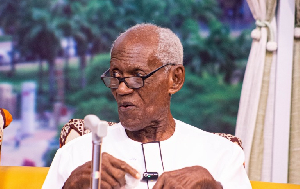- Home - News
- TWI News | TV
- Polls
- Year In Review
- News Archive
- Crime & Punishment
- Politics
- Regional
- Editorial
- Health
- Ghanaians Abroad
- Tabloid
- Africa
- Religion
- Election 2020
- Coronavirus
- News Videos | TV
- Photo Archives
- News Headlines
- Press Release
General News of Tuesday, 11 October 2011
Source: GNA
CSSPS refutes allegation
Accra, Oct. 11, GNA - Mr. Samuel Oppong, National Coordinator of the Computer Schools Selection and Placement System (CSSPS), has refuted allegation of malfeasance in the system, levelled against it by Challenging Heights, a non-governmental organization (NGO). He said that it was difficult for junior high school students opting for Science, General Arts, and Business to gain admission to the over-subscribe senior high schools than those who had chosen programmes like Home Economics, Agriculture science and Visual Arts. Mr. Oppong in an interview with Ghana News Agency (GNA) in Accra on Monday, said 93because the system used raw scores and not aggregates and when anybody uses aggregates to describe the placement it would mean that the person does not know how the whole system operates". He explained that each programme had its own cut off point and "the cut off point for Science is higher than General Arts, and General Arts is also higher than Business and Business is higher than Home Economics and Agriculture Science, which is also higher than Visual Arts, which most students do not choose and that is the least resistant."
Mr Oppong said the NGO acted out of ignorance and challenged its authorities to come out with evidence such as names of officials who had collected monies so that they would be handed over to the police. He said the CSSPS sought to achieve fairness and that 93this is a national exercise, which is very dear to the Government because of the 30 per cent catchments area allocation".
Mr Oppong stressed 93as far as I'm concern I have no idea of anybody giving money to any of my officers unless otherwise proven by the giver and confirmed the receiver".
He explained that the system was not a manual selection system but computerized and it would be very difficult for one to break through it since there were two types of selection placement of students to their respective schools thus 70 per cent placement and 30 per cent catchments area allocation placement.
Mr Oppong explained that the 70 per cent placement used six schools and programme choices made by the students when they registered with the West African Examinations Council, which was based on merit of which his outfit did not h ave authority to change any of the schools chosen by the students.
He said: 93We also used vacancies declared by heads of Senior High Schools, Vocational and Technical Schools to fill vacancies in schools." Mr. Oppong explained that if one used aggregates as a determinant, it was possible to have students who had chosen Science with aggregate six and 91nine ones' to have admission to any of the over-subscribe schools such as Holy Child School in the Central Region. He said 93again it is possible for a student with aggregates eight to gain admission to any of the over-subscribe schools if she or he had chosen Visual Arts. "This means that it is possible for students with aggregates six and 91nine ones' who had chosen Science or General Arts would not gain admission whiles it would be possible for those with aggregates eight and nine and chose Home Economics or Visual Arts to gain admission to the over subscribe schools. The NGO had petitioned the Commission on Human Rights and Administrative Justice (CHRAJ) to investigate malfeasance in the CSSPS and bring offenders to justice. It accused officers in charge of the CSSPS of abusing and collecting monies, some as high one thousand two hundred Ghana cedis (GH 1,200) in order to place students in senior high schools where they would otherwise not have been placed. This was contained in a statement signed by the President, Mr. James Kofi Annan, copied GNA in Accra on Monday. It said officers were removing duly merited and placed candidates from their chosen schools, and placing students whose parents had paid bribes in their places though those students did not obtain the required scores.
The statement alleged that some students who secured aggregate six in the Basic Education Certificate Examination (BECE) did not secure admission to any of the six schools they selected due to the corrupt practices.
It explained that the coordinators of the CSSPS had indicated that too many children selected 93first choice schools", and that over 6,000 candidates selected Wesley Girls High School in the Central Region as their first choice. One thousand of the number secured aggregate six in the BECE and that the school could only select just a little over 300 students.
"What we conclude from this example is that no student could gain admission to Wesley Girls High school ... if that student did not secure aggregate six with extremely high raw scores in the BECE. "However we currently have evidence that there are some students who the CSSPS has posted to Wesley Girls High School who secured aggregate eight in the BECE."
The statement said there was a similar evidence to show that there were students who had been placed in Holy Child School in Cape Coast who gained aggregate nine, though explanation from the Ministry of Education indicated that it was not possible for such students to be posted to that school through the CSSPS, with the calibre and number of students who selected the school. It said the situation was wide spread especially in the schools that the Ministry of Education had labelled 93first choice schools" in the categories of choice.
Some of the 93first choice schools" so labelled by the Ministry are Mfantsipim, Adisadel, Wesley Girls, Holy Child in the Central Region, Achimota, Presbyterian Secondary School in the Grater Accra Region, Aburi Girls in the Eastern Region and the Prempeh College in the Ashanti Region. 11 Oct. 11










